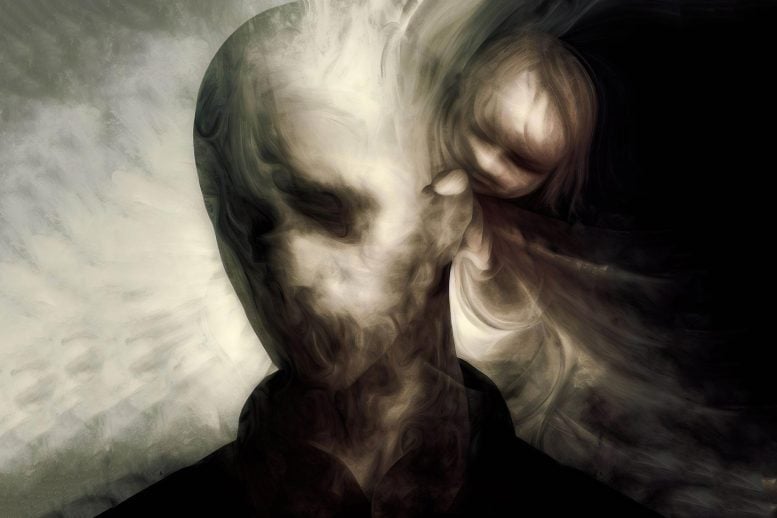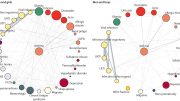
A study in Australia has revealed the severe impact of childhood maltreatment on mental health, attributing up to 40% of major mental health conditions such as anxiety, depression, and suicide attempts to such experiences. The research, which used extensive national data and robust analytical methods, indicates that addressing childhood maltreatment through comprehensive public health policies and preventive measures could significantly reduce the mental health burden in the country. This would not only prevent millions of mental health cases but also substantially decrease years of life lost to death and disability. Credit: SciTechDaily.com
Scientists expose the lifelong impact of childhood abuse and neglect.
A study focusing on childhood maltreatment in Australia has uncovered its alarming impact, estimating it causes up to 40 percent of common, life-long mental health conditions.
The mental health conditions examined were anxiety, depression, harmful alcohol and drug use, self-harm, and suicide attempts. Childhood maltreatment is classified as physical, sexual, and emotional abuse, and emotional or physical neglect before the age of 18. Childhood maltreatment was found to account for 41 percent of suicide attempts in Australia, 35 percent for cases of self-harm, and 21 percent for depression.
The analysis, published in JAMA Psychiatry is the first study to provide estimates of the proportion of mental health conditions in Australia that arise from childhood maltreatment. The researchers said the results are a wake-up call for childhood abuse and neglect to be treated as a national public health priority.
Potential Impact of Eradicating Childhood Maltreatment
“The results are devasting and are an urgent call to invest in prevention – not just giving individual support to children and families, but wider policies to reduce the stress experienced by families,” said Dr. Lucinda Grummitt, from the University of Sydney’s Matilda Centre, who led the study. “Investments to address childhood maltreatment have the potential to avert millions of cases of mental disorders in Australia.”
The analysis also found that if childhood maltreatment was eradicated in Australia, more than 1.8 million cases of depression, anxiety, and substance use disorders could be prevented. The study also found the elimination of childhood maltreatment in Australia would, in 2023, have prevented 66,143 years of life lost (death) and 118,493 years lived with disability, totaling 184,636 years of healthy life lost through mental health conditions.
Researchers examined data that included national surveys provided by the Australian Child Maltreatment Study in 2023 (8500 participants), the Australian National Study of Mental Health and Wellbeing 2020-2022 (15,893 participants), and the Australian Burden of Disease study 2023.
The study made use of analytical methods to investigate the link between child maltreatment and mental health, which isolated other influential factors such as genetics or social environments. This provides stronger evidence that childhood maltreatment causes some mental health conditions.
Global and National Context
Mental health conditions are currently the leading cause of disease burden globally and affect 13 percent of the global population. In Australia, suicide is the leading cause of death for young people.
Previous research (independent of the University of Sydney study) found over half (53.8 percent) of Australians experienced maltreatment during their childhood.
Dr Grummitt said there are effective interventions, such as programs to support children experiencing maltreatment or parent education programs, but the most sustainable solution to prevent child maltreatment is policy-driven prevention.
“Policies to alleviate stress experienced by families, such as paid parental leave, affordable childcare, income support like Jobseeker, and making sure parents have access to treatment and support for their own mental health could make a world of difference for Australian children.
“Addressing the societal and economic conditions that give rise to child maltreatment can play a large part in preventing mental disorders at a national level,” Dr Grummitt said.
The researchers cite an example in the United States where the introduction of state-paid parental leave policies and timely access to subsidized childcare were strongly linked to reduced rates of child maltreatment.
Reference: “Burden of Mental Disorders and Suicide Attributable to Childhood Maltreatment” by Lucinda Grummitt, Jessie R. Baldwin, Johanna Lafoa’i, Katherine M. Keyes and Emma L. Barrett, 8 May 2024, JAMA Psychiatry.
DOI: 10.1001/jamapsychiatry.2024.0804









Mindlessly ‘minding our own business’ when it comes to others’ dysfunctional or abusive child rearing often proves humanly devastating.
Yet, largely owing to the Only If It’s In My Own Back Yard mindset, however, the prevailing collective attitude (implicit or subconscious) basically follows: ‘Why should I care — my kids are alright?’ or ‘What is in it for me, the taxpayer, if I support social programs for other people’s troubled families?’
While some people will justify it as a normal thus moral human evolutionary function, the self-serving OIIIMOBY can debilitate social progress, even when social progress is most needed. And it seems this distinct form of societal penny wisdom but pound foolishness is a very unfortunate human characteristic that’s likely with us to stay.
Still, we can resist that selfish OIIIMOBY. If I may quote the late American sociologist Stanley Milgram, of Obedience Experiments fame/infamy: “It may be that we are puppets — puppets controlled by the strings of society. But at least we are puppets with perception, with awareness. And perhaps our awareness is the first step to our liberation.”
Meantime, people will procreate, some prolifically even, regardless of their questionable ability to raise their children in a psychologically functional/healthy manner.
Societally, there seems to be a general perception and treatment of human procreative ‘rights’ as though we’ll somehow, in blind anticipation, be innately inclined to sufficiently understand and appropriately nurture our children’s naturally developing minds and needs.
I sometimes wonder how much immense long-term suffering might have been avoided had these people received mandatory child-development science curriculum as high-school students. After all, dysfunctional and/or abusive parents may not have had the chance to be anything else due to their lack of such education and their own dysfunctional/abusive rearing as children. …
As a moral rule, a physically and mentally sound future should be every child’s fundamental right — along with air, water, food and shelter — especially considering the very troubled world into which they never asked to enter. And the health of all children needs to be of real importance to everyone — and not just concern over what other parents’ children might or will cost us as future criminals or costly cases of government care, etcetera — regardless of how well our own developing children are doing.
Though it’s only for the month of April, every day of the year should be Child Abuse Prevention Month in this world.
If survived, early-life child abuse, sexual or otherwise, left unhindered typically causes the brain to improperly develop. It can readily be the starting point of a life in which the brain uncontrollably releases potentially damaging levels of inflammatory stress hormones and chemicals, even in otherwise non-stressful daily routines.
It can amount to non-physical-impact brain-damage abuse: It has been described as a continuous, discomforting anticipation of ‘the other shoe dropping’ and simultaneously being scared of how badly you will deal with the upsetting event, which usually never transpires.
The lasting emotional/psychological pain throughout one’s life from such trauma is very formidable yet invisibly confined to inside one’s head. It is solitarily suffered, unlike an openly visible physical disability or condition, which tends to elicit sympathy/empathy from others. It can make every day a mental ordeal, unless the turmoil is prescription and/or illicitly medicated.
A mentally as well as physically sound future should be every child’s fundamental right — along with air, water, food and shelter — especially considering the very troubled world into which they never asked to enter; a world in which Child Abuse Prevention Month [every April] clearly needs to run 365 days of the year.
The wellbeing of all children needs to be of great importance to us all, regardless of whether we’re doing a great job with our own developing children.
Mindlessly ‘minding our own business’ often proves humanly devastating. Yet, largely owing to the Only If It’s In My Own Back Yard mindset, however, the prevailing collective attitude (implicit or subconscious) basically follows: ‘Why should I care — my kids are alright?’ or ‘What is in it for me, the taxpayer, if I support social programs for other people’s troubled families?’
While some people will justify it as a normal thus moral human evolutionary function, the self-serving OIIIMOBY can debilitate social progress, even when social progress is most needed. And it seems this distinct form of societal penny wisdom but pound foolishness is a very unfortunate human characteristic that’s likely with us to stay.
Still, we can resist that selfish OIIIMOBY. If I may quote the late American sociologist Stanley Milgram, of Obedience Experiments fame/infamy: “It may be that we are puppets — puppets controlled by the strings of society. But at least we are puppets with perception, with awareness. And perhaps our awareness is the first step to our liberation.”
_________
“It has been said that if child abuse and neglect were to disappear today, the Diagnostic and Statistical Manual would shrink to the size of a pamphlet in two generations, and the prisons would empty. Or, as Bernie Siegel, MD, puts it, quite simply, after half a century of practicing medicine, ‘I have become convinced that our number-one public health problem is our childhood’.”
—Childhood Disrupted, pg.228